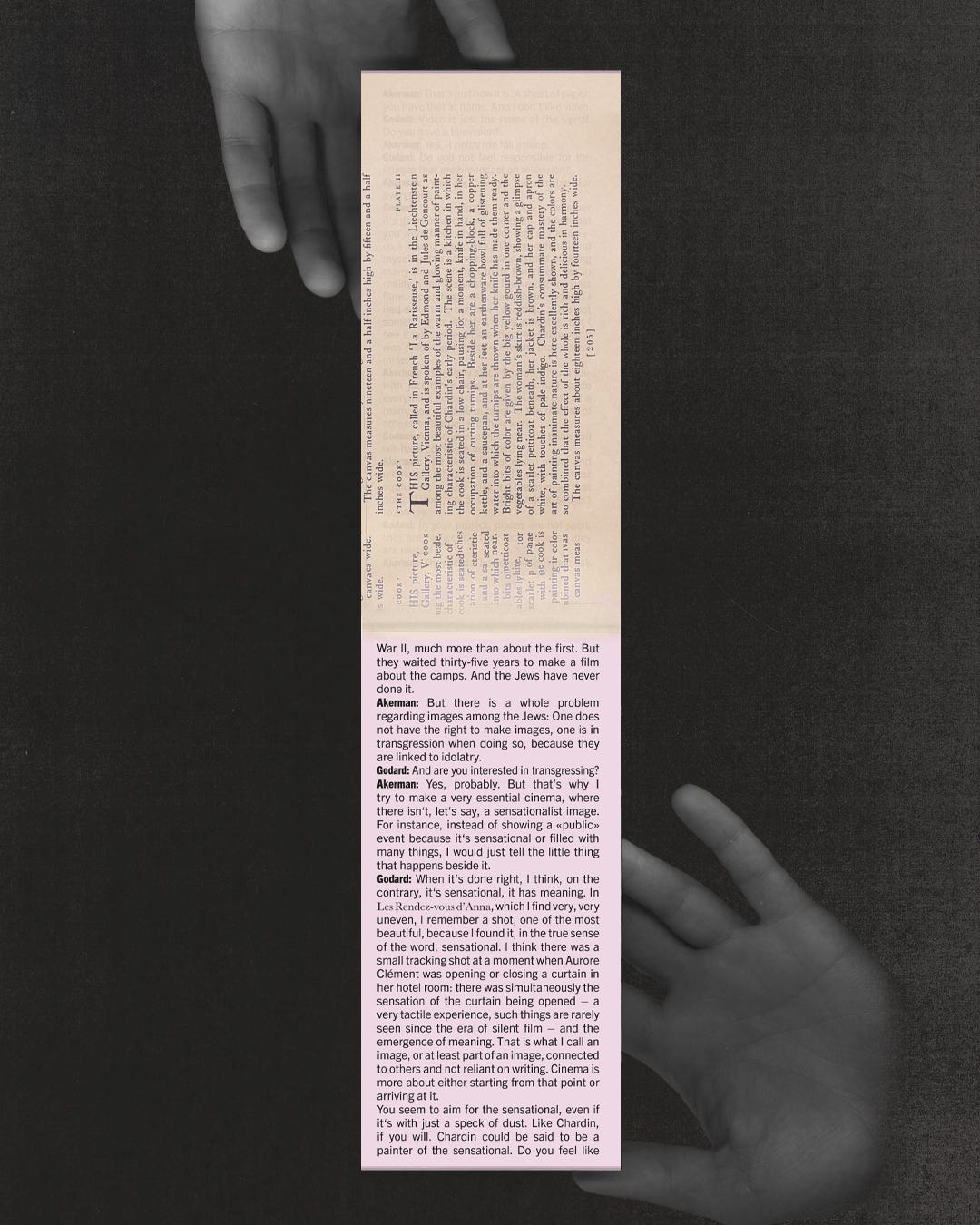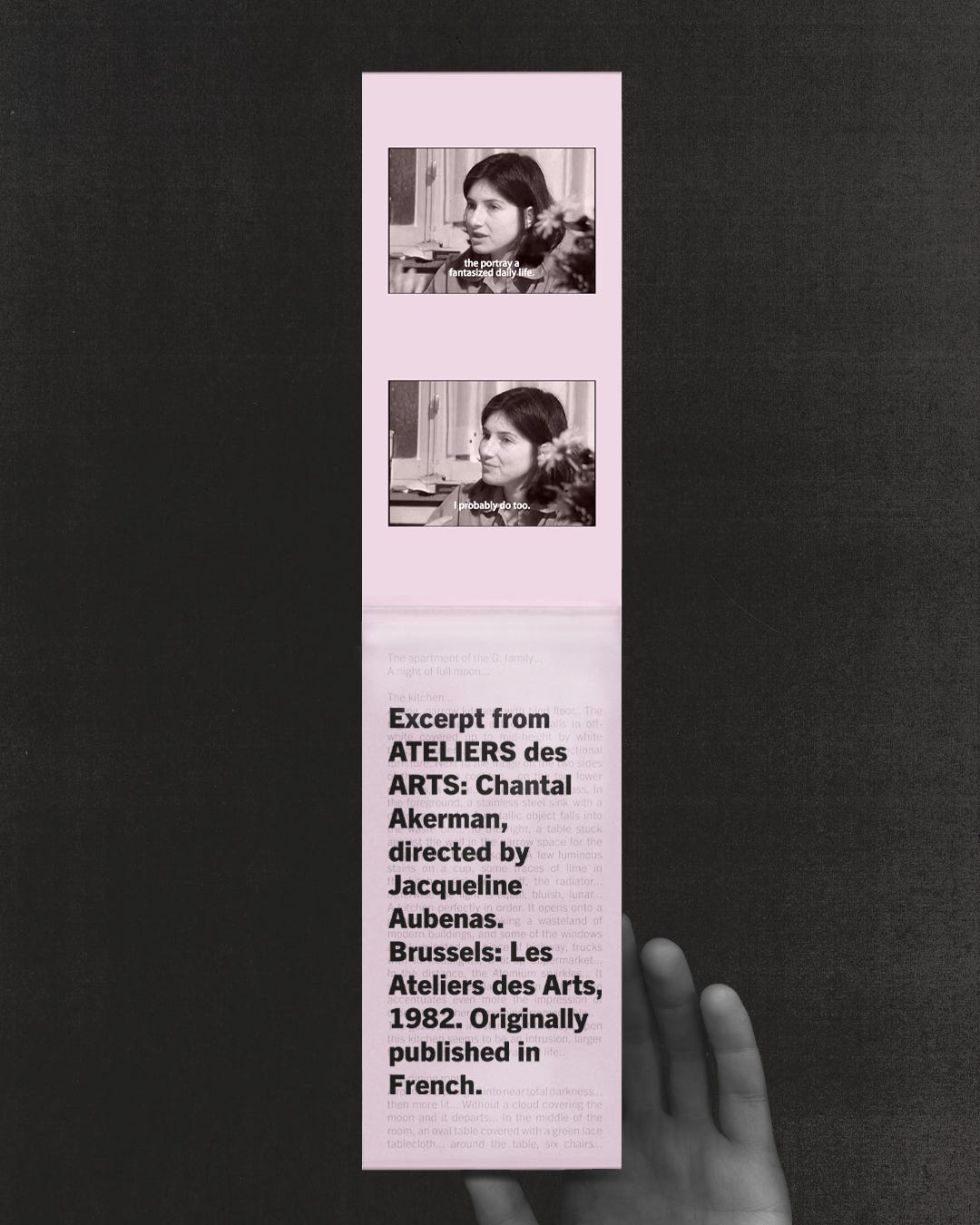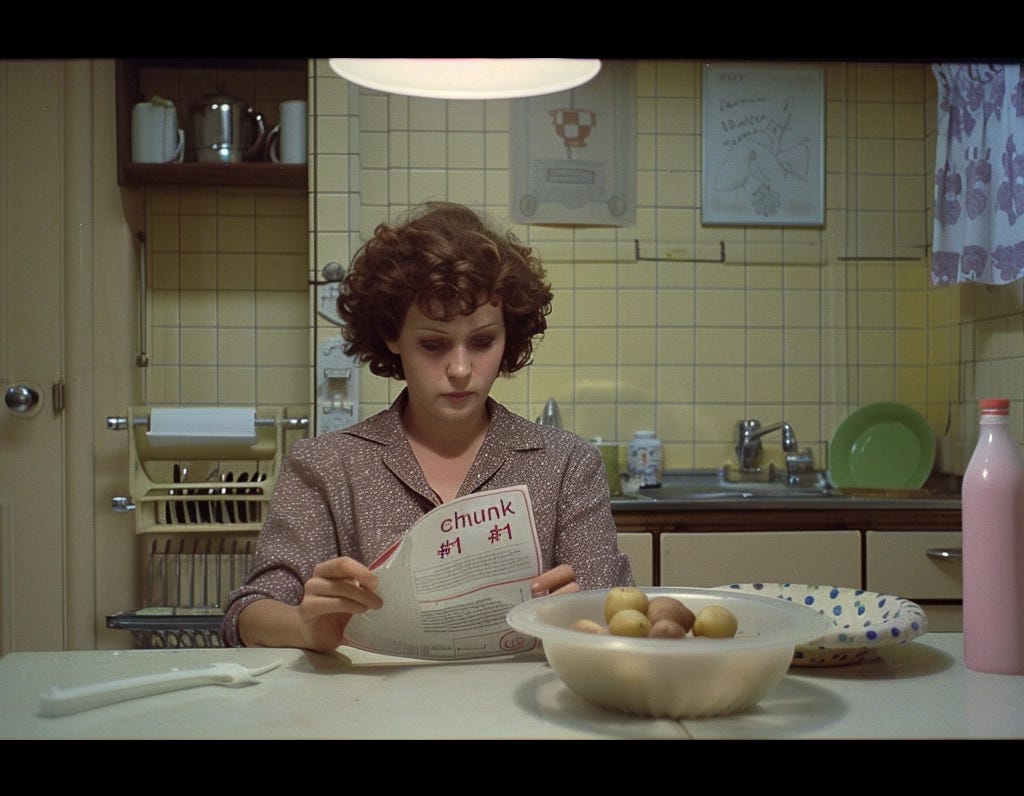Chunk #1: Chantal Akerman
Ten items by and about Chantal Akerman, including a conversation with Jean-Luc Godard and an excerpt from the initial screenplay of Jeanne Dielman.
Inspired by the zine and self-publishing culture, I've started a series called Chunk which will center on a specific theme or artist, published as a short list with excerpts from the featured books. As for its publication schedule, let’s just say it will arrive with the unpredictability of a cat walking into a room–whenever it pleases.
Chunk #1 is a short list of ten items by and about Chantal Akerman. For this list, I‘ve translated two particularly interesting texts that, as far as I am aware, are being presented in English for the first time: a conversation with Jean-Luc Godard [Item No. 7] and an excerpt from the initial screenplay of Jeanne Dielman, 23, quai du Commerce, 1080 Bruxelles, originally titled Elle vogue vers l’Amérique [Item No. 1], offering a narrative that shifts from the final film.
I've made 60 copies of Chunk #1, which are now available HERE with free shipping worldwide. These will be dispatched on April 29th. The ten items listed are initially exclusive to the printed catalog and will be available on the website 10 days later.
Here is the beginning of the conversation between Jean-Luc Godard and Chantal Akerman from Ça cinéma, n° 19: Jean-Luc Godard, directed by François Barat. Published in 1980 by Editions Albatros, this issue features Godard's conversation with Chantal Akerman, Luc Béraud, and Claude Miller. It also includes Eric de Kuyper's analysis of genre cinema, Michel Marie's discussion on the role of dialogue in contemporary French films using India Song as a case study, Marie-Françoise Grange's examination of the scriptwriting process, and Vincent Nordon's piece on the relationship between writing, music, and dance.
Jean-Luc Godard: I feel the need as a director or filmmaker to talk to other filmmakers about the film I‘m making. But that‘s strictly impossible because directors don‘t communicate with each other. I have contributed to this by introducing the notion of the author, similar to literature, which means that in the end, it‘s like a child or private property: you don‘t easily say bad things about each other. At most, we might say something positive about a film, but not critique it properly. I need to discuss my film, not just with technicians who talk about it in technical terms, but with people who do the same work. So, I thought: «Well... the only way to have a conversation is to organize something where people are given the opportunity to talk for an hour about what they are currently working on or planning to do». Otherwise, there is no discussion. I rarely get the opportunity to talk about my film with others. If I do, it‘s usually just a passing conversation at a table, but we don‘t really delve into the film. So there, I thought: for an hour, there must be one or two seconds where there can be a bit of communication. Having a place where I can talk to my colleagues… And then, following the classic schedule: projects, filming, editing. I have a project that I plan to shoot in three months, and then, three months later, I will start working on what people refer to as editing, although I don‘t personally use that term. What interests you about this proposal?
Chantal Akerman: It was more about you than anything else.
Godard: But it could have been a journalist who proposed it...
Akerman: I believe I wouldn‘t have done it because there are too many journalists who have asked me questions and generally when it‘s a journalist, I answer in a way that promotes my films.
Godard: But when it comes to me, is it because I am well-known or because I am a filmmaker?
Akerman: Oh, not at all. It‘s actually because, in seeing your films, I found the inspiration to make my own. That‘s what piqued my interest. I don‘t know if you realize what it‘s like when you‘re fifteen and discover your films without ever having heard of you. I was in Brussels and I didn‘t like cinema at all, I thought it was for idiots, everything I had been taken to see was Mickey Mouse and things like that. And when I randomly went to see one of your films, it made me want to make films. So it‘s really an emotional thing.
Godard: A project is the desire to do something. A film project is therefore the desire to do what?
Akerman: Before that, I used to write, in the way teenagers do, you might say. I think when you‘re a teenager, you write to unravel the various threads that are entwined around you. It‘s the time when you begin to think and become confronted with things you‘re becoming aware of, like whether to be violent or not... Then I saw Pierrot le Fou and it seemed to speak of our era, of what I was feeling. Before that, it was always The Guns of Navarone, and I couldn‘t care less about such things. I don‘t know, but it was the first time a film moved me, and so intensely. Perhaps that‘s why I wanted to create films that would be my own.
Godard: I try to present myself as a Martian, or a fool, or a very intelligent guy: so if you have a project, do you intend to leave people in the state you were in? Or is it you who want to feel that way again? Why did it make you want to make films? One could think that someone else might say: «Well, I‘m going to travel and ask if there are other films like that.»
Akerman: But that‘s exactly what I tried to do. I attempted to watch other films, to recapture that feeling, but it never happened again. Pierrot le Fou somehow became the defining cinema for me. In a way, it prevented me from appreciating other films because I was always seeking the emotion I felt that one time. Things don‘t repeat themselves like that. It took me some time to start liking other films.
Godard: Do you remember the first scene you shot? I do: I filmed my feet.
Akerman: I filmed my mother entering a large building and opening the mailbox. I had the urge to create something, and suddenly, it materialized as an obsession, it took shape through cinema. And then, once you start making them... I didn‘t question why or how, I didn‘t doubt this need, I followed it almost blindly. And I don’t know why…
Godard: Yes, but if someone were to ask you: «I need to understand for myself because the answers could help me find something beneficial for my own purposes...» For instance, if one were to question: «What‘s the purpose of high jumping?» It could be explained that: «It serves to strengthen the leg muscles.» «Ah, I see, I wasn‘t aware of that, so if it‘s necessary for me, I might give it a try.» So, what does it mean to have a film project?
Akerman: It‘s wonderful because it takes up time!
Godard: Is it more interesting to spend time on that than, for example, a job that would be just as good? Because generally, projects don‘t pay. How do you spend your time? How is your day structured? One could depict a day in the life at a factory, even if it isn‘t a precise representation…
Akerman: I wake up early in the morning and try to write.
Godard: Do you try to write instead of taking photos? However, in the end, will the film be essentially about taking photographs?
Akerman: Yes, but I write very precisely what I want to show, with all the details. I describe what I see in my head instead of taking photos.
Godard: Do you think we can describe what we see?
Akerman: No, we can‘t, but we can get close to it.
Godard: Do you not think that you might be mistaken? Do you believe that we can get closer rather than drift further away? Have you learned how to write?
Akerman: Yes, I‘ve learned to write.
Godard: On your own? Or did you go to school?
Akerman: I went to high school until the ninth grade, where I learned, shall we say, the basics of writing. However, it wasn‘t at school that I learned to write the way I write today. For me, writing is a very important phase, though not for every film I make.
Godard: This morning, did you write?
Akerman: Yes, this morning I took notes. But I didn‘t take notes about the film, I took notes around the film. I read a book by Marthe Robert about Freud‘s relationship with Judaism.
Godard: Did you read the whole thing this morning?
Akerman: Yes, I read the whole thing this morning, but anyway, I don’t read every part; there are passages that I skip.
Godard: Could you provide an example of a note, in an attempt to visualize it precisely as an image?
[…]
You can find the complete conversation between Godard and Akerman in Chunk #1.
Thanks for reading –
Sören






